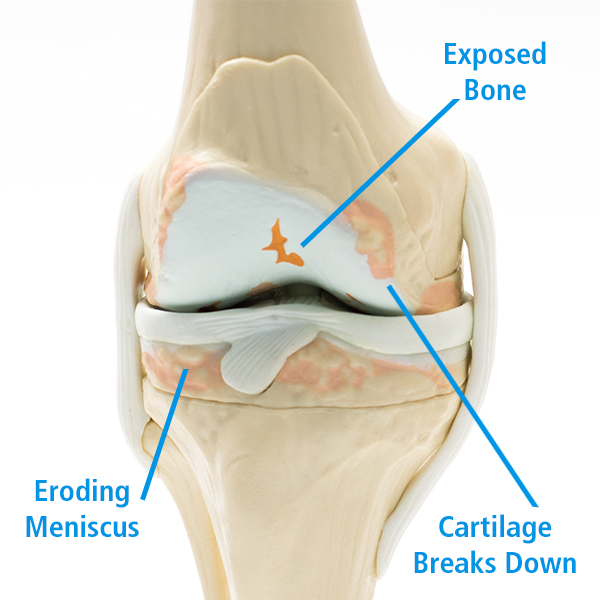What is Knee Osteoarthritis?
Osteoarthritis, also known as wear and tear arthritis, is a common problem for many people after they reach middle age. It is important to know that knee replacement is not the only option for osteoarthritis.
What is Knee Osteoarthritis?
Osteoarthritis is the most common type of knee arthritis. A healthy knee bends and straightens because of a smooth, slippery tissue called articular cartilage. This substance covers, protects and cushions the ends of the leg bones that form your knee. Between your bones, two c-shaped pieces of meniscal cartilage act as “shock absorbers” to cushion your knee joint. Osteoarthritis causes cartilage to wear away.
Key Factors that increase your risk:
Age
Heredity
Weight
Injury
Overuse
Other Illnesses

Watch this video on knee osteoarthritis
How it Happens
Osteoarthritis occurs over time. When the cartilage wears away it becomes frayed and rough. Moving the bone along this exposed section is painful. If the cartilage wears away completely, it can result in bone rubbing on bone. To compensate for the lost cartilage, damaged bones may start to bow outward and form painful spurs. Pain and stiffness are the most common symptoms of knee osteoarthritis. Symptoms tend to be worse in the morning or after a period of inactivity.
Key Factors
Age: The ability of cartilage to heal itself decreases as we age. Osteoarthritis typically affects people middle-aged and older.
Injury: Previous knee injury, such as a sports injury, can lead to osteoarthritis later in life.
Other Injury: If you have had other problems with your knee, such as gout, knee infection, or Lyme’s disease, your risk for osteoarthritis increases.
Overuse: People in occupations that involve repeated kneeling or squatting, or heavy lifting and walking, are vulnerable to repetitive stress injuries in the knee. This makes them more likely to develop osteoarthritis.
Weight: The more you weigh, the more stress you put on your knee joints.
Heredity: Certain genes have been linked to osteoarthritis. Inherited traits, such as being bowlegged, knock-kneed, or double jointed can also put you at greater risk for the disease.
Signs and Symptoms
Do you wake up with stiff knees?
Do your knees hurt when going up or down stairs?
Do you frequently take medication for knee pain?
Do activities you enjoy cause knee pain?
Have you been told you need knee replacement surgery?
Do You Suffer from Knee Pain?
Make an appointment and let our team evaluate you for Knee Osteoarthritis. You’ll be glad you did!
